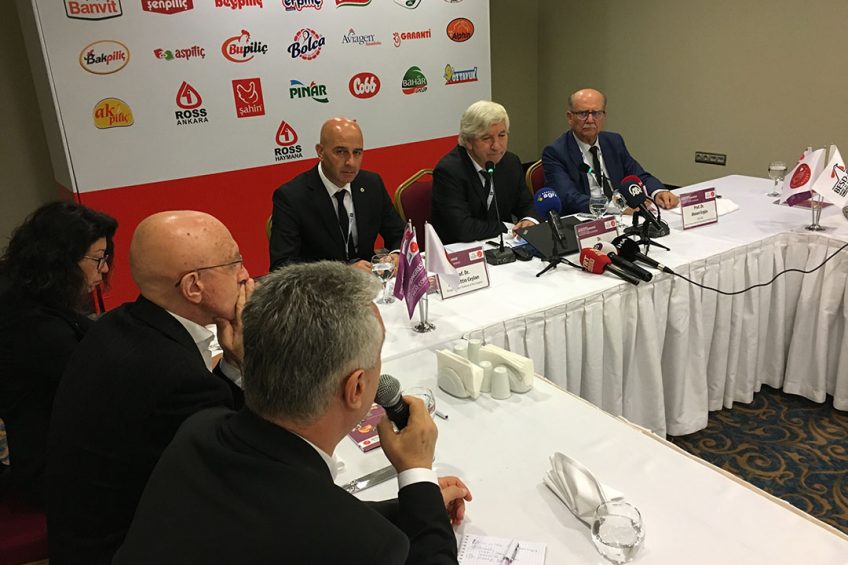Growth potential despite headwinds

Scientists and industry professionals from 32 countries attended the 5th International Poultry Meat Congress, organised by BESD-BIR, the Turkish Poultry Meat Producers and Breeders Association. With poultry being a global industry, Turkey has the same potentials and challenges as anywhere else, and some specific ones too.
‘’There is an immense need for deep knowledge, research and a place to share the information and discuss it,” said poultry meat congress chairman Necmettin Ceylan. That is why he is fully engaged in the organisation of the biannual congress in Turkey. ‘’We do a lot of research ourselves, mainly at our university in Ankara, but want to have a platform for international knowledge transfer as well.” The Turkish poultry meat industry grows fast and is information hungry, because it wants to be on top of the game so exports to even the most demanding markets is possible. BESD-BIR president Sait Koca on that matter: ‘’When it comes to salmonella prevention, antibiotic reduction and health we are meeting or exceeding European standards. As an example, our average usage of antibiotics is below the European average. We would like to start exporting to Europe as well, as we could supply the EU with fresh products instead of them having to rely on frozen meat from Brazil. However, politics stand in our way, at this moment in time.” According to the Turkish department of agriculture, last year the ministry conducted meticulous inspections in 896 poultry operations and took a total of 15 thousand samples.
The potential for growth
Mr Koca hails the achievements of his members over the last couple of years: ‘’Our poultry meat industry grew around 115% in a very short period during the last 10 years, producing 2,383 million tons in 2017. The largest part of the production growth was exported, as export increased by 751% from 51 thousand tons to around 443 thousand tons. We export to 81 countries around the world, but our main market is our neighbouring country Iraq. It is clear that the Turkish poultry meat industry makes valuable contribution to supply healthy, enough and stable foods for humans, not just those living in Turkey, but also those living in foreign countries.” However, Mr Koca sees opportunities for growth of domestic consumption as well. “At this time Turks eat about 22 kg of poultry meat per person per year. Compared to – for example – Israel and the US, where people eat respectively 58,2 and 49, 3 kg per year, there is a huge potential for growth of consumption in Turkey.”

Macro-economic problems
Despite great growth indicators over the last couple of years, the Turkish poultry producers aren’t too optimistic. Mr Koca added: ‘’We import about 50% of all our feed ingredients and are dependent on foreign supplies of vaccines and enzymes as well.” As all imports are valued in US dollars and 80% of revenues (domestic) are in Turkish Lira, times are hard. Mr Ceylan explained: ‘’Turkey was hit by US sanctions after a defence deal. That was one of the reasons our Lira devaluated by about 50% in the last year alone. With our feed cost being 70% of the total production cost, that is a heavy burden. On top of that the domestic economic situation didn’t allow the producers to raise the price of meat, decreasing profitability as a consequence.” According to Mr Ceylan the industry didn’t raise domestic prices for seven months, but are now slowly increasing prices. ‘’Some companies where reporting negative margins, which made the situation untenable.”
Some years ago Turkish companies didn’t see the need for the last push in efficiency, but with decreasing margins, they now want to be on top of their game. Mr Ceylan added: “For both antibiotic reduction and efficiency our producers need to focus on farm conditions, biosecurity and good management throughout the production chain. Nutrition, which is my specialty, is key. In feed production and formulation, improvements can still be made. We have to take into account that the genetics of our birds have changed and that we cannot rely on the nutritional requirements which haven’t been updated for years. There is a need for deep information on how to improve intestinal development of our birds and feed them with the best feed possible. Inferior feed and too much protein are a huge risk for production.” Mr Ceylan firmly believes that antibiotic usage can be further reduced when feed technicians, nutritionists and veterinarians work together more closely.
New opportunities
Mr Ceylan is sure that poultry meat will stay the meat of choice in Turkey, even with rising domestic prices. “As an industry we are reaching out to paediatricians and consumers explaining how healthy, tasty and quality controlled poultry mean is. Of course we have to guarantee all these claims and we have the insurance schemes in place to be able to do so.” A sound production system helps exports as well. BESD-BIR president Mr Koca sees new opportunities in China. ‘’We see a huge problem in the swine industry in China, which will lead to drastic changes in meat consumption and export. Until now we mainly export chicken feet to China, via an intermediary in Hong Kong. That construction comes at a price, of course.” That is why Mr Koca is emphasising the need for bilateral agreements with China to ramp up direct exports. ‘’We are working hard to get our foot in the door and create a new export market. China is important for us and will be even more important in the future.”
 Beheer
Beheer




 WP Admin
WP Admin  Bewerk bericht
Bewerk bericht